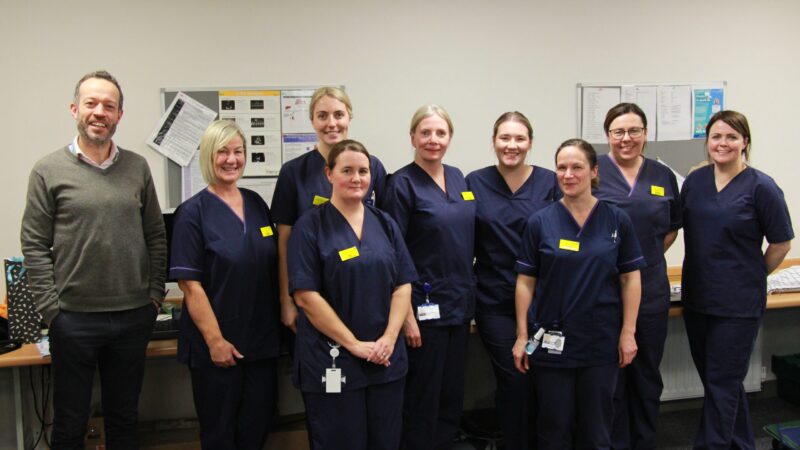
A Teesside-based heart failure team is making huge steps in future-proofing the service – all for the benefit of patients in the community.
The specialist service supports heart failure patients across Hartlepool, Stockton-on-Tees and the wider area to self-manage their condition.
With an estimated 900,000 people in the UK diagnosed with the condition, the right pathway, appropriate treatment and support means that survival rates, experience of care and quality of life for many people living with heart failure can dramatically improve.
Now, the heart failure team is striving ahead in many ways, from a successful bid for project funding to researching testing and treatment.
Managing Heart Failure @home
The specialist nurses are among the first in the country to help patients self-manage their conditions at home. It will reduce the need to come into hospital. The team is one of ten successful NHS sites to adopt a national project, Managing Heart Failure @home.
The project means that patients diagnosed with heart failure can have their health monitored remotely and self-manage their condition from the comfort of home. They will receive personalised support of a community nurse.
Using digital technology, patients can recognise and report if their condition deteriorates. This will allow the team to take timely action.
The project, a collaboration with the Trust’s integrated single point of access service and the Home First team, will see more patients receiving observations at home and less need for face-to-face visits for those comfortable with the technology.
Heart failure specialist nurse Trudy Hunt said: “This is a massive achievement that will bring many benefits to our patients and their carers. It will, most importantly, reduce the need for hospital admission.
“It will allow those taking part in the project to be more in control of their condition and through integrated care, the service can deliver an improved experience for patients.
“We’re excited to start this project and to link in with virtual wards and the NHS Long Term Plan.”
To find out more about Managing Heart Failure @home, visit NHS England’s blog.
Researching heart failure
The team is also currently involved in a number of research projects. Studies include drug trials testing new treatments and looking at the possible benefits of an exercise programme for patients diagnosed with heart failure.
Heart failure specialist nurse Karen Hann is leading on the projects alongside the Trust’s research and development team.
She said: “As part of the specialist team, I’ve had the fantastic opportunity to work one day a week with the research team. This has allowed a more collaborative approach to recruiting for research studies into heart failure care.
“The whole team’s involved. We’re all actively screening to find potential candidates to take part in the research trial. We’re really enjoying learning more about how involvement in studies can ultimately enhance the care we provide to our patients.”
Point of care testing

Most recently, two of the team were invited to the British Society for Heart Failure’s annual meeting. Specialist nurses Lynette Hardy and Anne-Marie Doyle used the opportunity to share best practice. They presented the findings of their successful research trial on point of care testing devices.
Point of care testing is performed near or at the site of a patient. The results can lead to possible change in the care of a patient.
Lynette said: “This was a great opportunity for us to showcase our work, discuss our findings with peers. We’ve put the North Tees team firmly on the map. It was fantastic to have recognised the great work being carried out locally to improve patient care.”
The aim research’s was to analyse whether point of care testing can improve the efficiency of care in the community. It offered insight into whether the testing can provide a safer, more-timely method of monitoring in people with heart failure.
The trial compared readings with laboratory samples and ultimately showed that point of care testing is indeed accurate and reliable.